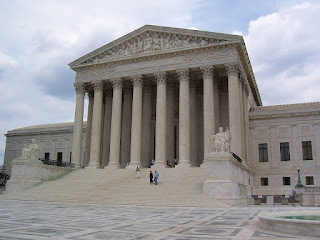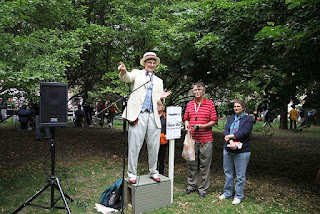If you give it some thought, Christmas is a holiday which invites skepticism regarding Christianity. It may in that sense almost be called "Anti-Christian." This isn't merely because it's become almost entirely about making and spending money, about marketing, about sanctimony and relentless religious posturing. Rather, it's because there's nothing about it that has anything to do with a historical Jesus, and everything about it is either manufactured or based in pagan myth and tradition. It's a great Christian holiday which isn't in the least bit Christian in nature or origin, but Christians have chosen it and describe it as Christian, and insist that it be treated as peculiarly Christian.
The Christian story of Christmas, to the extent that it purports to be accurate, clearly isn't accurate. The trappings of Christmas--the tree, the Yule Log, the exchange of gifts, mistletoe, etc.--don't have their origins in Christianity. Why, then, do Christians insist on it, and make it their greatest holy day?
We begin with what should be known by all, but perhaps is not. That is, that there is no evidence, no report, and indeed nothing, indicating or even suggesting Jesus was born on what we now call December 25th. The Roman Church began celebrating it as the day of the birth of Christ in 336 C.E., more than 300 years after the event is said to have taken place. There is considerable evidence, however, that it was the date on which the birth of pagan gods such as Sol Invictus and Mithras was celebrated, and was within the season during which the great pagan celebration of Saturnalia took place, which involved gift-giving and parties, and featured roleplay in which slaves and servants become masters and their masters slaves and servants.
As might be expected of a day celebrating the birth of sun gods such as the Roman ones I referred to, it occurs very near to the winter solstice. The winter solstice was celebrated by pagans of all kinds long before Jesus is said to have been born, as the time at which the sun ceases "dying" and is in effect "born" and the days slowly become longer and brighter.
Then there is the story of Christmas described in the Gospels. According to that of Luke, Jesus was born during the reign of Augustus, in Bethlehem, because of the requirements of a census taken while Quirinius (Publius Sulpicius Quirinius) was governor of the Roman Province of Syria, which included Palestine. The census supposedly required all to travel to the town of their birth, to be counted. According to the Gospel of Matthew, Jesus was born during the reign of Herod the Great.
The early Christians seemingly kept poor records, but the Romans were great record-keepers. The census of Quirinius was taken several years after the death of Herod. No Roman census required everyone to travel to their ancestral home--a requirement which would likely have caused chaos in travel and administration, and would have been a dramatically large burden to all concerned. Why, then, does Christianity claim that Jesus of Nazareth was born in Bethlehem? Because it was the City of David, and Jesus through his father Joseph was claimed to be a descendent of David and the messiah was supposed to be born there.
Then there is the manger problem. The nativity scene or setting we're familiar with involves a stable, a manger, various animals and shepherds. Early Christians maintained Jesus was born in a cave, though. That would seem to be the case according to the Church of the Nativity in Bethlehem, where the place at which Jesus was born is depicted by the star in the photograph at the head of this post, and is referred to as a "grotto." That place along with other locations and objects important to Christianity was discovered by Helena, the very busy and industrious mother of the Emperor Constantine, who roamed the Holy Land in search of such things, and is considered a saint according to the Catholic Church.
We have heard, and still hear, many urge that we should "keep Christ in Christmas." But it can fairly be maintained that he was never there in the first place, and isn't there much now. Instead, he's been inserted, in a rather shameless, brazen fashion, into an ancient time of celebration made significant for reasons having nothing to do with him or Christianity.
It's harmless enough, of course, to create a holiday and designate it as a time for special celebration of a particular person or event. This is done with some frequency, in fact. If that is what Christians have done in creating Christmas, who could complain? But a religion such as Christianity cannot be doubted, and that is especially the case where holy books are concerned.
If we give it some more thought, perhaps in fact Christmas isn't Anti-Christian, but peculiarly Christian in the sense that it is contrived, a pretence, much like being a Christian is, today, and likely has been forever, sadly. If to be Christian is to follow the teachings of Jesus, Christians are mostly frauds.
We should by all means celebrate the Christmas season. It's great fun, and always has been, since long before Christ and Christianity. The winter solstice has always been significant as well. But one with think the pious and self-righteous should have some decency, and restrain themselves from insisting we stop treating the Christmas season as being solely something which it clearly is not.


.png)
_Children_of_the_night_2.png)

.png)

.png)









%20-%20Copy.jpg)
.jpg)
